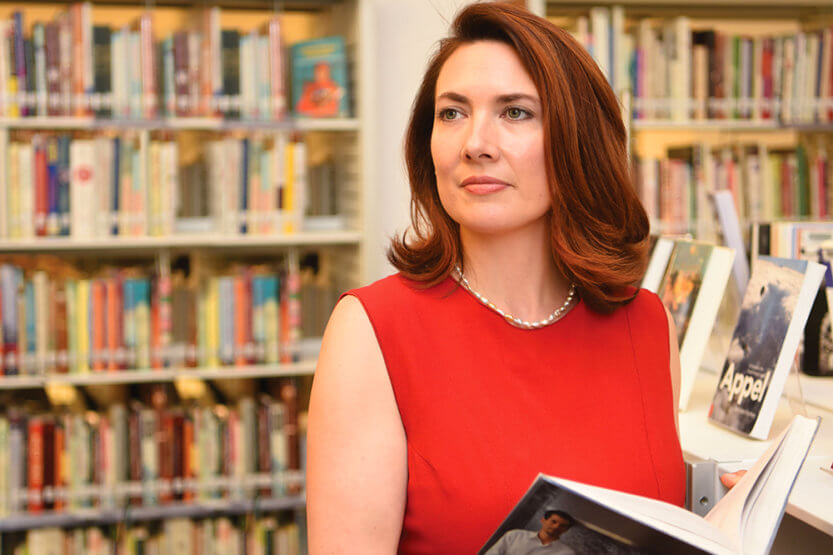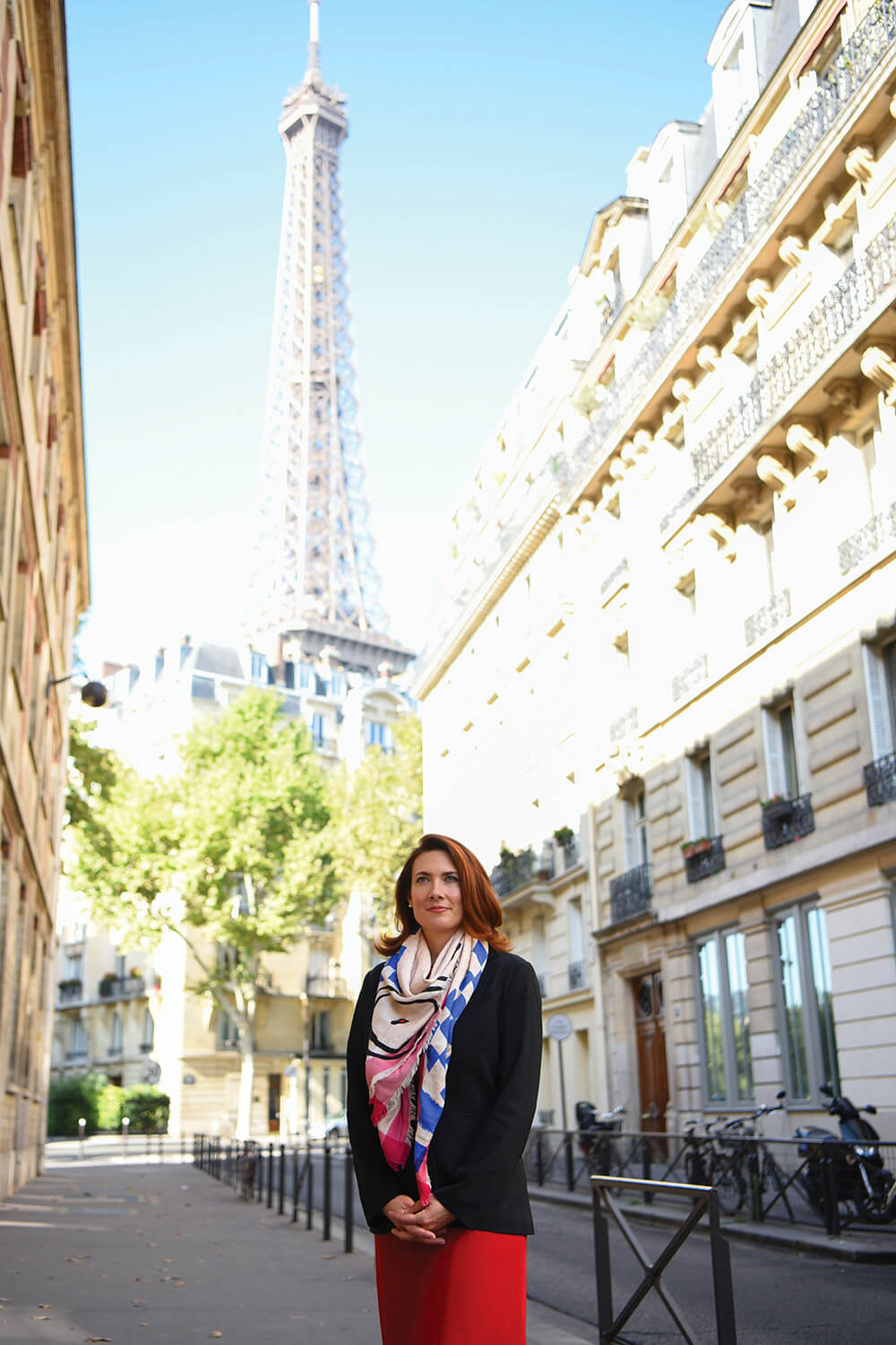Bibliophile
 Audrey Chapuis heads the American Library in Paris, which is about to celebrate its 100th anniversary.(Image by Krystal Kenney)
Audrey Chapuis heads the American Library in Paris, which is about to celebrate its 100th anniversary.(Image by Krystal Kenney) From earliest childhood, Audrey Chapuis, MA ’06 LIS, was in love with books. “No one knows where it came from,” she says, “but since I was 3 years old I was obsessed with them. At 14, I tried to get a job at the local bookstore; they told me I was too young. When I finally got to work at Widener Library at Harvard … well, that was a dream come true.”
At Widener, Chapuis shelved books while earning a bachelor’s degree at Harvard’s Extension School. She completed the Library and Information Science master’s program at Illinois and landed a job at Northwestern University’s law library. But while a library career might have been everything a book lover could want, Chapuis also had a second youthful fascination that consumed her.
She recalled it in a personal essay she wrote last spring for Literary Hub, a book-centric website: “As a girl growing up in Texas, I became—quite mysteriously to the Texans around me—a Francophile. I ate up stories of the Lost Generation and swooned thinking about Bohemians lounging on café banquettes, waving cigarettes and arguing about ideas … Teenage years in Texas seemed painfully banal in comparison. Bygone writers had Parisian bacchanals; we got keg parties in the woods.”
So if her life had a script, she followed it: a French husband, a year in London, then a move to Paris, where in 2015 she merged both of her childhood passions in joining the staff of the American Library in Paris as collections and reference librarian. Then in September 2018—one more chapter into the story—she became the Library’s director.
The light of books
Sitting in her office on a Left Bank side street, an easy five-minute walk from the Eiffel Tower, Chapuis speaks comfortably about the institution she leads, which will mark its 100th year in 2020. The first thing she wants to make clear is that, despite what that kid in Texas may have been daydreaming about, this library is—and has been almost from its start—a lot more than a collection of books.
It was, an earlier director once wrote, a “war baby.” During World War I, the American Library Association developed its Library War Service campaign, collecting and distributing more than 1.5 million donated books to soldiers of the American Expeditionary Forces in France. After the Armistice was signed and camp libraries around France were being dismantled, volunteers culled and set aside some of the books as a reference collection in the French capital.
There were enough readers in Paris hungry for books in English—and for a place to connect with other Anglophones—that private financial support was quickly rounded up, and the collection of leftover volumes became the core of a permanent, independent subscription library. The American Library in Paris was formally incorporated as a nonprofit in May 1920. Its motto: “Atrum post bellum, ex libris lux”—“After the darkness of war, the light of books.”

The Library’s “Evenings with an Author” program has featured such notable writers as Martin Amis, Ta-Nehisi Coates and Salman Rushdie (shown with Chapuis). (Image courtesy of Audrey Chapuis) The American Library in Paris is an outgrowth of the Library War Service campaign, which distributed more than 1.5 million books to the American Expeditionary Forces in France during World War I. (Images courtesy of the the American Library in Paris)
Early members included the likes of Edith Wharton, Thornton Wilder and Ernest Hemingway. Stephen Vincent Benét holed up in the Library to write his poem, “John Brown’s Body.” Gertrude Stein, it was said, would argue with Alice B. Toklas in the stacks. It was, after all, Paris in the ’20s.
But if Paris then was the height of worldliness, when it came to libraries, the French could learn a thing or two from the Americans.
“Very early on,” Chapuis says, “our library did things that were very different to the French. We had open stacks, where you could browse instead of having to ask for each item you wanted and wait for it to be retrieved and brought to you. We had Sunday hours. We had story hours for children. To French librarians in the 1920s, these were new ideas.”
Nearly 5,000 members from 60 countries
The Library grew into a true center of American culture: a community crossroads, a literary and intellectual home away from home for Anglophone expats and tourists, and for Parisians who were drawn to America and the English-speaking world. Today, it counts 4,600 members from more than 60 countries, offering them a lending library and reference resources to be sure, but also an ambitious and eclectic calendar of free programs for adults, teens and young children. (Non-members can attend most events for a small fee.)
Teen audiences can choose from weekly readings and movies, a quiz night, and a variety of targeted programs—such as workshops on yoga or how to produce a comic book—fueled by Oreos, popcorn and Dr. Pepper. For younger kids, there’s a regular story hour with plenty of loud singing. “Being a parent abroad can be very alienating,” Chapuis says. “The children’s programs can create meaningful bonds for the parents as well as for the kids.”
But it’s the adult programs that attract the most attention around the French capital, where the Library is known for its “Evenings with an Author,” a series of talks by prominent writers, poets, journalists, filmmakers, musicians, artists and public intellectuals. Among the famous names who’ve dropped by: Martin Amis, Ta-Nehisi Coates, Laurent de Brunhoff, Salman Rushdie, Kwame Alexander.
“We’ve had journalists from The New York Times and Le Monde—they draw the biggest crowds,” Chapuis says, “and panel discussions on topics like race and identity, immigration, the gilets jaunes, feminism … Our audiences are well-read. Last year, we had Viet Thanh Nguyen, who won a Pulitzer Prize for The Sympathizer. He sat for almost three hours with people. Extraordinary!”

“I was never a public speaker, but I’ve become comfortable with it,” says Chapuis, discussing her role as a fundraiser for the Library. It has launched a campaign to raise $1 million euros to expand its collections and programs. (Image byKrystal Kenney)
Librarian as fundraiser
On a daily basis, Chapuis juggles the tasks of leading a library, a cultural center and a nonprofit organization. She describes her nonprofit role as her biggest stretch.
“I guess self-discovery can happen at any age,” she says with a smile. “I never saw myself as head of a nonprofit. Extroverts in the library profession are rare—that’s a cliché, but it’s true. I was never a public speaker, but I’ve become comfortable with it. That’s because I believe in what I’m saying.”
These days, a fair amount of her speaking is of the “Please give us money” variety.
“For the centennial in 2020,” Chapuis says, “we’ve started a drive to raise a million euros. We’re looking to increase our collections, both physical and digital, and to do more programming. But at the top of the list is to increase space for teens and children. Our programs for the youngest ones are getting so popular they can’t fit in the children’s library anymore.
“I can’t overestimate how important it is to make a welcome space for people, a place where you don’t have to buy or consume anything—you can just be here thinking. That’s fundamental to what we do.”
From her time in the iSchool at Illinois, Chapuis names Linda C. Smith, MS ’72 LIS (now professor and executive associate dean), as particularly influential as well as “Frank Kellerman, my indexing and abstracting professor, who began every class by practically singing ‘Hello, indexers and abstracters!’ [Kellerman died in 2013].
“Our end-of-semester project in his course was to index a short book—about the cell, if memory serves. It was one of the best exercises in the categorization of information, which is still librarians’ bread and butter. That and customer service, of course.
“Most of my program was remote, but there were 10 days of boot camp to start and then one weekend a semester when classes met physically. There were about 20 of us at boot camp and I’m still friendly with almost everyone I met. We’re all over—France, Germany, Alaska—and that was a 10-day period, 15 years ago, but we keep in touch. Those connections have really helped me. If there’s a brief crisis at the library, I’ll go to some of them for an opinion.
“It’s good that I have that support. Because running this place is not like running an academic library, where you get an idea, have to move it through a committee and then get it approved by the provost. Here the velocity of change can be frightening—like driving a sports car very fast on a narrow road— but you have to get through the fear and make a decision.”
“The job is all-consuming. I dream about it.”

